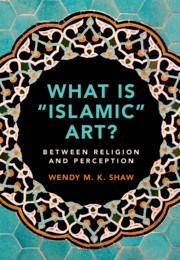Book contents
- What is “Islamic” Art?
- What is “Islamic” Art?
- Copyright page
- Epigraph
- Contents
- Figures
- Color Plates
- Preface
- Note on Transcultural Communication
- Introduction From Islamic Art to Perceptual Culture
- 1 The Islamic Image
- Chapter 2 Seeing with the Ear
- Chapter 3 The Insufficient Image
- Chapter 4 Seeing with the Heart
- Chapter 5 Seeing through the Mirror
- Chapter 6 Deceiving Deception
- Chapter 7 The Transcendent Image
- Chapter 8 The Transgressive Image
- Chapter 9 Mimetic Geometries
- Chapter 10 Perspectives on Perspective
- Conclusion Out of Perspective
- References
- Index
- Plate Section (PDF Only)
Chapter 6 - Deceiving Deception
Published online by Cambridge University Press: 27 September 2019
- What is “Islamic” Art?
- What is “Islamic” Art?
- Copyright page
- Epigraph
- Contents
- Figures
- Color Plates
- Preface
- Note on Transcultural Communication
- Introduction From Islamic Art to Perceptual Culture
- 1 The Islamic Image
- Chapter 2 Seeing with the Ear
- Chapter 3 The Insufficient Image
- Chapter 4 Seeing with the Heart
- Chapter 5 Seeing through the Mirror
- Chapter 6 Deceiving Deception
- Chapter 7 The Transcendent Image
- Chapter 8 The Transgressive Image
- Chapter 9 Mimetic Geometries
- Chapter 10 Perspectives on Perspective
- Conclusion Out of Perspective
- References
- Index
- Plate Section (PDF Only)
Summary
Chapter 6 examines how later stories about artistic competition, related by al-Maqrizi, Mustafa ‘Ali, and Qadi Ahmad, consider painting in the context of deceptive rhetoric in pursuit of truth, as advocated in Plato’s Phaedrus. The chapter concludes by comparing this understanding of painting with that rooted in a similar story, the competition of Zeuxis and Parrhasius. Adopted from antiquity by German Enlightenment thinkers as the paradigm for representation and the disinterested observer, this story establishes paradigms of artistry and mimesis in the Western tradition that cannot account for opposite premises established in Islamic discourses. The comparison between the two narratives underscores the antique tradition as part of a shared Islamic and European heritage diverging through distinct histories of interpretation. Comparison with European theorization of the image uncovers the bias inherent to normative art-historical premises about the social and psychological functions of the image that obscure alternative modes of perception, whether in cultures whose alterity is determined by being in the past or by being elsewhere. The story of the competition of the artists outlines an alternative paradigm, rooted in spiritually trained subjectivity rooted in the heart and resisting the rationalist exteriority of representation presumed in dominant modern models.
Keywords
- Type
- Chapter
- Information
- What is 'Islamic' Art?Between Religion and Perception, pp. 159 - 183Publisher: Cambridge University PressPrint publication year: 2019



